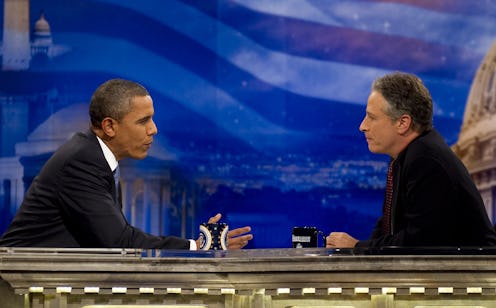News
How Jon Stewart Transformed The News — Forever
About ten years ago, I bet a friend twenty bucks that Jon Stewart would, at some point, run for office. In retrospect, that was a bit of wishful thinking on my part: He’s since declared unequivocally that he won’t be a candidate for any elected position, and I suspect he’ll stick by that. But as much as I’d love to see a Stewart presidency, I can’t quite say I’m disappointed, because during his 15 years as host of The Daily Show, he’s affected far more positive change than most U.S. politicians do in their entire careers.
Making an audience laugh is hard. So is giving a nightly news broadcast. Stewart was better at both than most people are are at either, and his combination of comedy and political analysis allowed him to be informative in a way that mainstream news outlets simply aren’t. Make no mistake: Stewart is a genuinely and uniquely important journalist, and his departure from The Daily Show leaves a serious gap in news coverage.
If there’s anything that Americans of all political stripes can probably agree on, it’s that our country’s political system is dysfunctional, illogical and absurd. Everyone basically knows that American politics are crazy, and Stewart wasn’t breaking any new ground when he went on TV every night to emphasize this.
This, to me, is Stewart’s single greatest contribution to journalism: He made the news interesting. He took thorny but enormously consequential national issues and rendered them entertaining and humorous. You learned a lot watching his show, and you usually didn’t even realize you were learning.
What Stewart did spectacularly was explain exactly how this craziness works, not simply that it exists. You came away from his programming knowing a bit more about what political dysfunction actually looks like in real life, and why politicians make the decisions they do. He educated us about the inner workings of government — or, as with his coverage of the 2013 government shutdown, inner non-workings. Take a look at this clip.
It’s funny, it’s lighthearted, and incorporates clips from both Willy Wonka & The Chocolate Factory and Schoolhouse Rock. It’s very easy to watch. But look at what’s going on beneath the surface: Stewart explains the process by which a law’s constitutionality is challenged, summarizes the arguments politicians made for the shutdown, provides rebuttals to those arguments, and shows how the rest of the media was covering of that same issue. That’s more than most mainstream news programs accomplish in a month; Stewart did it in seven minutes.
Speaking of mainstream news: Most traditional news outlets have an annoying habit of presenting two sides of every argument as if both were equally valid, even if they’re not. This is usually done in the name of being “objective” — that is, with good intent — but it results in a disingenuous “on-the-one-handism.” Bad arguments aren’t exposed, and neither are good ones. It’s a terrible way to explain public policy.
But Stewart never fell into this trap. He wasn’t afraid to tell the truth as he saw it about contentious issues, and he didn’t attempt to draw equivalencies between political arguments when he didn’t see them. It reminds me of a sage piece of advice Rachel, the features editor at Bustle, gave me in preparation for a piece. “Just make sure to call a spade a spade,” she said. Stewart always did that, and he was one of the few.
Of course, the truths and events that Stewart devoted his show to were often upsetting, aggravating, and depressing. As a masochist who’s chosen to write about news for a living, let me tell you: It is upsetting, aggravating, and depressing. I don’t blame anybody one iota for tuning out of the news for reasons of self-preservation. But remarkably, Stewart managed to report the news accurately while also leaving you smiling, regardless of the content. It could be argued that some news shouldn’t leave you smiling, but by keeping a light tone, Stewart made news and politics digestible for a huge mainstream audience — and that’s a fantastic, desperately-needed public service.
I’ve long been of the mind that one of the biggest impediments to political progress in America is that, as evidenced by our awful voter participation rate, a huge portion of the populace doesn’t really care about politics. This makes perfect sense — life is exhausting enough as is, and very few emotionally-adjusted individuals want to think about the government and public policy after a long day at work. But it also means that a lot of people don’t make themselves part of the political process, and this halts any potential change in its tracks.
This, to me, is Stewart’s single greatest contribution to journalism: He made the news interesting. He took thorny but enormously consequential national issues and rendered them entertaining and humorous. You learned a lot watching his show, and you usually didn’t even realize you were learning. You were too busy laughing. The more informed all of us are about the world around us, the greater the hope is that someday, our political system will be a little less terrible than it is.
Stewart’s departure from TV does indeed leave a huge gap in journalism, but there’s a silver lining. A couple silver linings, in fact — they go by the names John Oliver, Larry Wilmore, Aasif Mandvi, Jessica Williams, Stephen Colbert... you get the point. Stewart himself is irreplaceable, but the news model he pioneered — equal parts interesting, hilarious and informative — is already being replicated by the best of his peers, and if John Oliver’s ratings are any indicator, likely will be for some time.
Despite never referring to himself as a journalist, Jon Stewart showed that a better, more effective type of journalism was possible. That’s his legacy, and it’s a an extremely admirable one.
